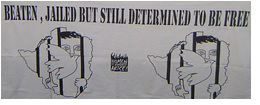Contains some nudity
Monday, May 19th, 2008 by Susan PietrzykI’ll admit I went to see Sandra Ndebele’s show at HIFA because the description included: This show contains some nudity. My interest was not nudity (tho I don’t mind seeing naked male or female bodies, particularly if artful and/or exuding pride). More I was thinking my interest was the crowd – who was there, as well as how they reacted. There were lots of men. Lots of cell phones taking pictures. Heads shaking. Laughing. Sure, the show spurred controversy, as I understand is often the case with Sandra Ndebele. Some feel she uses nudity and sexual appeal as a marketing gimmick. That she’s using shock value to seek attention which may result in further objectifying women. She disputes this, saying quite the opposite. As the program indicates, her intent is to “revitalise and preserve cultural traditions and empower young African women through culture.”
In this case, controversy seems a good thing, gives pause for thought. Early on in the show, my interests shifted from the crowd to the importance of understanding the details of women’s lives in the past. Not women’s lives only as mothers or wives, but the ways women shared and passed down knowledge within their communities. Women’s lives in and of themselves were dynamic, full of emotion and intelligence as well as love and support for each other. Thinking along these lines made me more fully realise that the show may have contained nudity, but the content of the show was not nudity. Rather, the content – a nice blend of seriousness and humour – is a story with multiple messages.
I see no reason to provide a summary of the story. Instead, I’d say the story conveys and advocates in ways beyond restating the plot. The story is about recapturing history; rather I should say herstory. To look back in time and see as well as celebrate that the herstory of women is not one of oppression only. This is not to say oppression didn’t exist in the past. But, women of yesteryear were vibrant. And brave. Sandra Ndebele seems particularly interested in capturing the vibrancy of the clothes women wore; that these clothes had meanings and were symbols of prestige, even power. Herein lies the present day controversy: The clothes. Sexy gimmick? Or something far more insightful? I say more power to Sandra Ndebele and the 20 women in the show. What they did is proudly present both a call and an avenue to better understand not only histories, but also herstories.



 She was so badly beaten across her breasts that they swelled for days and later pus accumulated inside them. She had to visit the hospital everyday for almost a week to get the pus squeezed out. Jane* had committed the “serious crime” of participating in a demonstration to demand that the voices of ordinary Zimbabweans be included in the
She was so badly beaten across her breasts that they swelled for days and later pus accumulated inside them. She had to visit the hospital everyday for almost a week to get the pus squeezed out. Jane* had committed the “serious crime” of participating in a demonstration to demand that the voices of ordinary Zimbabweans be included in the 





